- Home
- Clive Barker
Gutted: Beautiful Horror Stories
Gutted: Beautiful Horror Stories Read online
CRYSTAL LAKE PUBLISHING
The Final Cut by Jasper Bark
Blackwater Val by William Gorman
Devourer of Souls by Kevin Lucia
Tales from The Lake Vol.1
Tales from The Lake Vol.2
Wind Chill by Patrick Rutigliano
Eidolon Avenue: The First Feast by Jonathan Winn
Flowers in a Dumpster by Mark Allan Gunnells
The Dark at the End of the Tunnel by Taylor Grant
Tribulations by Richard Thomas
Writers On Writing: An Author’s Guide
Eden Underground: Poetry of Darkness by Alessandro Manzetti
Modern Mythmakers: 35 Interviews with Horror & Science Fiction Writers and Filmmakers by Michael McCarty
Or check out other Crystal Lake Publishing books for your Dark Fiction, Horror, Suspense, and Thriller needs, and join our newsletter while you’re there.
Copyright 2016 Crystal Lake Publishing
Be sure to sign up for our newsletter and receive a free eBook
All Rights Reserved
ISBN: 978-1-945174-26-1
Cover Design:
Caitlin Hackett
https://caitlinhackett.carbonmade.com.
Interior Artwork:
Luke Spooner
www.carrionhouse.com
Interior Layout:
Lori Michelle
www.theauthorsalley.com
Proofread by:
Lisa Childs, Guy Medley,
Paula Limbaugh, Robert Teun
This is a work of fiction. Names, characters, businesses, places, events and incidents are either the products of the author’s imagination or used in a fictitious manner. Any resemblance to actual persons, living or dead, or actual events is purely coincidental.
No part of this publication may be reproduced, stored in a retrieval system, or transmitted in any form or by any means, without the prior permission in writing of the publisher, nor be otherwise circulated in any form of binding or cover than that in which it is published and without a similar condition including this condition being imposed on the subsequent purchaser.
CONTENTS
Foreword by Richard Chizmar
Stephanie M. Wytovich
The Morning After Was Filled with Bone
Brian Kirk
Picking Splinters from a Sex Slave
Lisa Mannetti
Arbeit Macht Frei
Neil Gaiman
The Problem of Susan
Christopher Coake
Dominion
Mercedes M. Yardley
Water Thy Bones
Paul Tremblay
A Haunted House is a Wheel Upon Which Some Are Broken
Damien Angelica Walters
On the Other Side of the Door, Everything Changes
Richard Thomas
Repent
Clive Barker
Coming to Grief
John F.D. Taff
Cards for His Spokes, Coins for His Fare
Amanda Gowin
Cellar’s Dog
Kevin Lucia
When We All Meet at the Ofrenda
Maria Alexander
Hey, Little Sister
Josh Malerman
The One You Live With
Ramsey Campbell
The Place of Revelation
COPYRIGHT ACKNOWLEDGEMENTS
All stories are original to this anthology, except the following, used with permission:
“The Problem of Susan,” © 2004 Neil Gaiman. First published in Flights.
“Coming to Grief,” © 1988 Clive Barker. First published in Prime Evil.
“The Place of Revelation,” © 2003 Ramsey Campbell. First published in 13 Horrors: A Devil’s Dozen Stories Celebrating 13 Years Of The World Horror Convention.
Doug Murano:
To Rocco, Eva, Luca and Baby Girl: You’ll find the beauty if you decide to look for it.
I hope you do.
D. Alexander Ward:
To my wife, my daughter, and my family, who honor me with their love and support.
FOREWORD
Many years ago—in the May 1996 issue of Locus, to be exact—genre critic extraordinaire, Edward Bryant, wrote the following about my first short story collection, Midnight Promises:
“Chizmar certainly believes in—and explores with painful, honest, dead reckoning—human suffering, pain, and occasional transcendence. And that’s why he’s well worth the reading.”
I promise you . . . I don’t open this brief foreword with Bryant’s words of praise in an effort to boost my own ego, nor to establish an immediate sense of credibility.
In fact, many readers may argue that the above sliver of a review doesn’t even fall into the category of “praise.” It’s more an understanding on Bryant’s part, a kind and thoughtful understanding of the engine that drives me as a writer and editor and human being.
And that’s my point here, folks, in relation to Bryant’s insightful observation and the fine volume of stories you now hold in your hands.
Two simple, yet powerful words:
I understand.
***
I’ve written about it before—in essays, and introductions to my own work and the work of others. Most of us writers and editors have done so once we’ve reached a certain rung in our career ladders; it’s practically a rite of passage:
What internal vision drives us as artists and entertainers; how and why do we see the things we see, things others inevitably catch only corner-of-the-eye glimpses of or miss altogether; and perhaps my all-time favorite: my God, wouldn’t you rather sit down and write about something happy and filled with golden rays of sunshine?
My response—and the responses of many of my peers—has always been straightforward and bluntly honest: what makes you think I have a choice?
Seriously.
It’s just how I see the world around me, how I see it and feel it.
I’m a pretty cheerful guy, living an extremely fortunate life, but when it comes to my writing and enjoying the fictional work of others, I tend to ignore the sunshine and explore the dark shadows and dirty corners instead.
I guess it’s just where I feel the most at home, and where my vision is the sharpest.
Take this little exercise for example:
You might stop at a traffic light and glimpse an old man standing on a street corner with a wrinkled paper bag in his hand and think: aww, how sweet, the old guy’s off to the park to feed the pigeons or eat his lunch by the lake.
I might see something entirely different.
Poor old guy looks sad. Lost. Lonely. Maybe even desperate. I bet his wife died recently. He’s unshaven. His pants and shirt are filthy. Is that dirty laundry in the bag and he’s on his way across town to the laundry mat . . . or something more sinister? Is that a stain seeping along the bottom of the bag? A scarlet stain?
Yes, sir, that’s exactly how I might see it, folks—and as I noted above: what makes you think I have a choice?
There is beauty all around us, and there is horror all around us. Sometimes, it’s impossible to tell the difference.
I see what I see, and I feel what I feel.
I don’t really have much of a choice.
I believe it’s that way for most of us writers.
I would bet anything it’s that way for Stephanie M. Wytovich, whose exquisitely-crafted poem opens Gutted: Beautiful Horror Stories.
She writes: “You took ever
ything I had left, but there in that skeletal smile, I’ve never been more beautiful, even after all the horrible things that I’d done.”—and all I can do is nod my head in silent agreement.
She understands.
***
The editors of Gutted: Beautiful Horror Stories are Doug Murano and D. Alexander Ward.
I’ve never met either gentleman, nor spoken with them on the telephone.
I don’t know if they are young (although I’m betting they are based on their endless enthusiasm, passion, and work ethic) or middle-aged or elderly (like my old man on the sidewalk with the paper bag in his hand).
I don’t know if they are married or single, patriarchs or childless, slender or burly, tattooed or pierced, Democrat or Republican.
I don’t even know what the “D” stands for in Mr. Ward’s byline.
None of this matters a bit to me.
What does matter is this: Doug Murano and D. Alexander Ward have assembled a veritable feast for all discerning readers of dark fiction.
Gutted: Beautiful Horror Stories thrilled me and chilled me—and made me think about the world around me—in ways not many other anthologies have ever been able to accomplish (which is why I agreed to shoehorn the writing of this foreword into an already overflowing work schedule).
There is darkness and terror and heartbreak to be found in these pages, but also redemption and hope and wisdom. It’s a fragile balance, and one to be greatly admired. Every detail, from the careful selection of these fifteen stories and one poem to the thoughtful order in which they appear, is spot on and designed for a finer reading experience.
I could write something about each and every story in the book. I liked them all that much. But I won’t. I will leave the amazements—and the terrors—for each of you to experience firsthand. Alone. In the dark.
Instead, I’ll tease you about the innovative horrors to be found in Paul Tremblay’s “A Haunted House is a Wheel Upon Which Some Are Broken” and Ramsey Campbell’s “The Place of Revelation.”
I’ll promise you wonder and heartbreak in tales such as Clive Barker’s “Coming to Grief” and John F.D. Taff’s “Cards for His Spokes, Coins for His Fare,” in which Taff successfully channels both Ray Bradbury and Stephen King to weave a splendid dark fantasy all his own.
Finally, I’ll hint at the unimaginable shocks waiting for you in Lisa Mannetti’s “Arbeit Macht Frei” and even the darkest of love stories in Brian Kirk’s “Picking Splinters from a Sex Slave” and Kevin Lucia’s “When We All Meet at the Ofrenda” and Maria Alexander’s “Hey, Little Sister.”
Take my advice: read the stories in the order in which they appear. Take your time to savor them. Think about them. Heal from them.
I don’t know a whole lot about Doug Murano and D. Alexander Ward, but I do know this: they’ve done the horror genre a great service with this book. Readers and writers, alike.
Murano and Ward see a different world than most people see; they understand—and I can offer them no higher compliment.
Richard Chizmar
April 12, 2016
THE MORNING AFTER WAS FILLED WITH BONE
Stephanie M. Wytovich
My bed held an imprint that I wasn’t ready to sleep with
so I stood in front of my bathroom mirror
applied my favorite shade of red lipstick to my teeth,
teeth that were locked in a permanent smile that held
nothing but words shaped by broken liquor bottles and empty ashtrays,
by unfinished poetry and 157 sleeps filled with nightmares
and the blankets made of your memory. The cigarette smoke
from the circles under my eyes
caused me to bleed soot, to cry ash for so long
that my eyes crawled out of their sockets and rolled down the drain,
drowning in the sludge I coughed up from my lungs,
tangled in the hair that no longer brushed against my cheeks.
With them, went my lips, tired from too many months of promised love,
of forgotten kisses; they crawled off my face
like the worms I hoped would soon eat your body,
like the maggots that bred inside your mouth, that fucked
on the top of your tongue. My lips were poisoned by too many days
of neglect, and I washed them down the sink with the blood
that stained the flesh that covered my skull. It peeled off like soft clay
eager to fall from an unwanted body
where the cold would be forced to embrace it.
I spat at the looking glass that told me I was diseased,
that I was tainted, that I was foul, and I felt for the washcloth
I kept on the rack above the toilet I puked in three times a day. I turned
the faucet to cold, forced it to run ice, and I splashed a baptism
against my bare-bone face while I used the rag to shine my skull. I brushed cobwebs out of the hollows of my sockets, wove blood roses in their place, and in
the spots where I used to blush, I rubbed Gerbera daisies—
I bought them myself—until their burgundy color stained what used
to be my cheeks. And in that bathroom with three lightbulbs burned out,
and a tiled floor sticky with last night’s sweat, I tilted my head back and screamed
because death wasn’t something I felt, that I carried with me
in the rot in my chest, in the scratch at the back of my throat. It was something
that I wore. I ran my hands over the slick sheen of bone. I laughed at my blindness
because I could finally see. You took everything I had left, but there in that skeletal smile,
I’ve never been more beautiful, even after all the horrible things that I’d done.
PICKING SPLINTERS FROM A SEX SLAVE
Brian Kirk
The box he kept her in was five-and-a-half feet long. I got a glimpse of it as they hauled it from the house, three large policemen lifting on each side as though carrying a heavy coffin to a hearse. Wanting, I suppose, to be a part of history. To take a proverbial brick from the Berlin Wall. They all broke into sheepish grins as the cameras began to flash. Like best men walking down the aisle at a poon hound’s wedding. As if they’d done something noble or heroic, rather than finally follow up on the third tip dropped by a neighbor, who they’d locked up several times for petty crimes.
Five-and-a-half feet long. She was four-foot-nine when he took her. Would have been five-seven now if not for the stooped neck. If not for the stunted growth. But I guess her unattained height is the least of my concern. Or maybe it’s all summarized in that stolen inch.
Here’s how I found out they’d found her. I’m driving home from a gig—I live in Jersey now, I lived in Connecticut then. I’m listening to 96.1 The Thump on the FM dial—which was Meagan’s favorite station. Back then. The one she made me listen to while driving her to-and-from school. It played six minutes of pop songs sandwiched between sixteen minutes of ads for Clearasil and maxi pads. You’d think I would have stopped listening to the station after she was gone, but I couldn’t. In the six years she was missing, the station changed format eight times. Went from pop to oldies to NPR back to pop to sports talk to classic rock back to pop to contemporary rock, which I think just means bland music. It’s terrible, but, then again, I’m not really listening.
They interrupted a Bryan Adams song with one of those screeching AMBER alert sounds. Then, from the ethereal airwaves sent from some turnstile station, I hear:
We have breaking news to report to you right now.
Oh my goodness we do.
Yes, my goodness. Meagan Towser, a young girl from the tri-state area who was reported missing six years ago, has just been located.
Amazing, just amazing.
Amazing is right. According to sources on the scene she has been held captive all this time in a house mere miles from the home she was allegedly abducted from.
I i
magine the radio waves streaming through the air like some toxic breeze. Birds falling dead from the sky in droves. The voices get huskier, grave and earnest.
Reports indicate she may have been held captive in a box.
Oh, God, that’s terrible.
Terrible.
Oh, God.
God, that’s terrible. Just terrible.
Terrible, God.
I live alone in a tiny condo now, I lived in a ranch home with a family back then. The one Meagan was taken from by a not-too-distant neighbor. It was me, my wife, Debbie, and a dog named Nugget, but Nugget ran away. Nugget smelled like Doritos chips and attic dust, but I loved the little fella. Debbie ran away too. She had smelled more like spring air fabric softener.
Sometimes I wonder if Debbie took Nugget like that not-too-distant neighbor took our little girl. Come to think of it, we crated our dog during the daytime as well. And did so out of love.
Let’s get back to the box. Four rough-hewn sheets of plywood bought from Home Depot and cut by one of the store’s employees. The planks still had the lumberyard’s orange logo painted on each side. Soft wood that splintered easily, evidenced by the back of Meagan’s shoulders, arms, and legs. Skin pocked like strawberry seeds from all the untreated splinters.
Say it took her four years to grow to her full height, a span from age thirteen to seventeen. That leaves two years spent with her head thrust up against the top and her feet crunched down below. Her neck cranked forward, knees bent, crammed against the splintered underside of the lid. Pitch dark—he kept her stuffed under his raised bed like a collection of porno mags. Stuffy, dusty. He didn’t drill air holes, so she breathed whatever air seeped in through the thin slits on each side. You can hear your breath in a box like that. The hollow sound of every exhale. You can also hear your heart.
I’ll skip the sordid details. To be honest, I don’t know them anyway. Our conversations, if you can call them that, never involve what went on inside that house. Think I don’t want to know? Please. I’m the worst person for this to happen to. A failed comedian filled with morbid curiosity. My twisted mind keeps churning out jokes.
I hate moving, but it’s easy with my daughter. She comes packed in her own box.

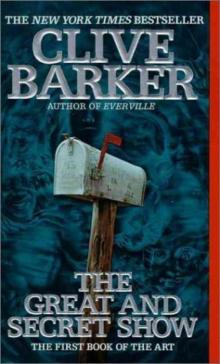 The Great and Secret Show
The Great and Secret Show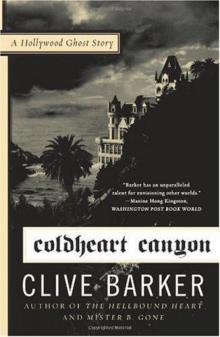 Coldheart Canyon: A Hollywood Ghost Story
Coldheart Canyon: A Hollywood Ghost Story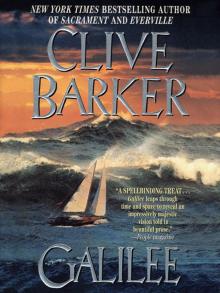 Galilee
Galilee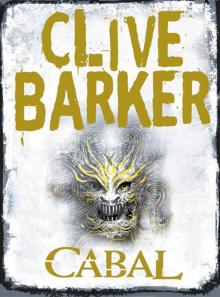 Cabal
Cabal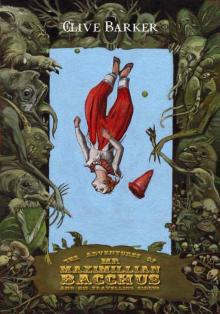 The Adventures of Mr. Maximillian Bacchus and His Travelling Circus
The Adventures of Mr. Maximillian Bacchus and His Travelling Circus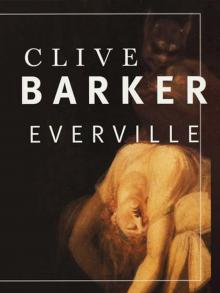 Everville
Everville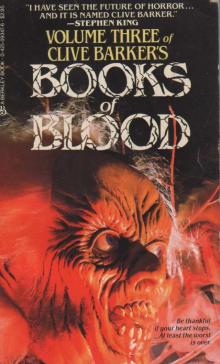 Books of Blood: Volume Three
Books of Blood: Volume Three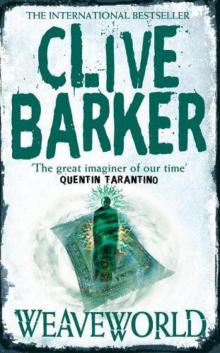 Weaveworld
Weaveworld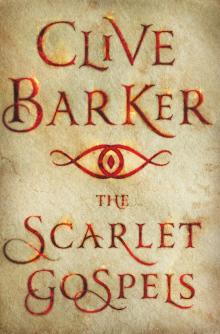 The Scarlet Gospels
The Scarlet Gospels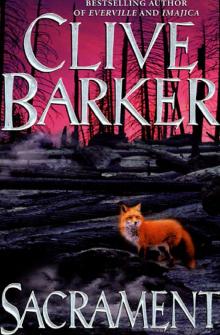 Sacrament
Sacrament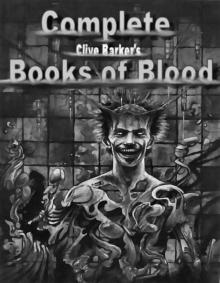 Books of Blood: Volumes 1-6
Books of Blood: Volumes 1-6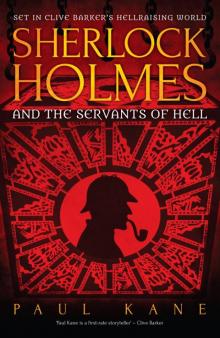 Sherlock Holmes and the Servants of Hell
Sherlock Holmes and the Servants of Hell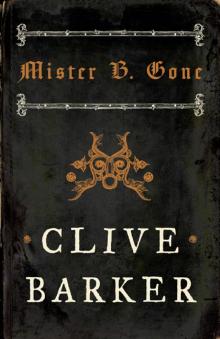 Mister B. Gone
Mister B. Gone Imajica
Imajica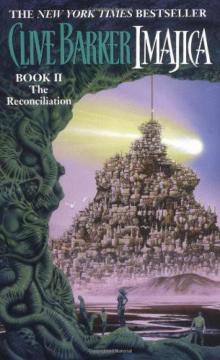 The Reconciliation
The Reconciliation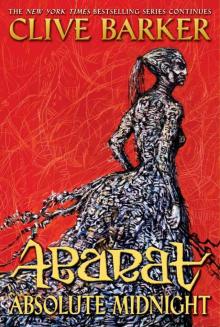 Abarat
Abarat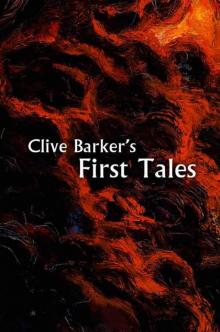 Clive Barker's First Tales
Clive Barker's First Tales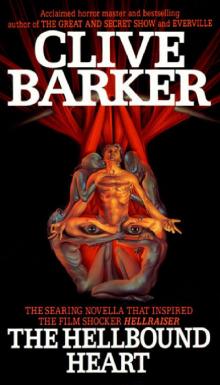 The Hellbound Heart
The Hellbound Heart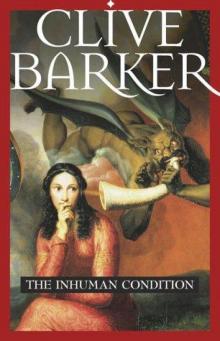 The Inhuman Condition
The Inhuman Condition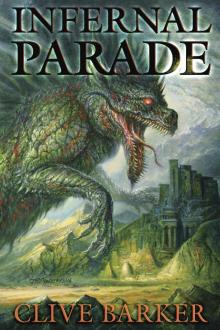 Infernal Parade
Infernal Parade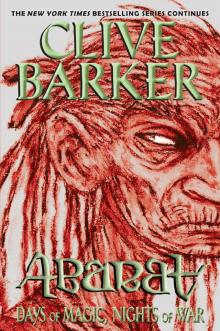 Days of Magic, Nights of War
Days of Magic, Nights of War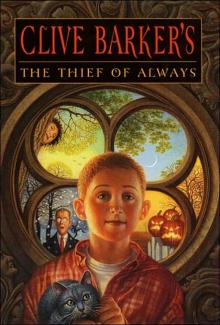 The Thief of Always
The Thief of Always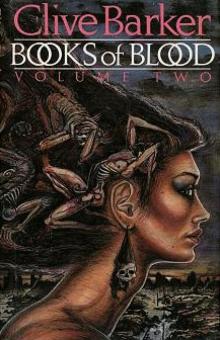 Books of Blood Vol 2
Books of Blood Vol 2 The Essential Clive Barker
The Essential Clive Barker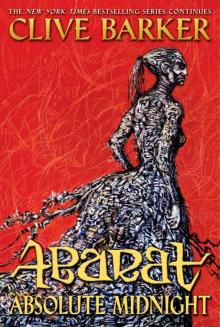 Abarat: Absolute Midnight a-3
Abarat: Absolute Midnight a-3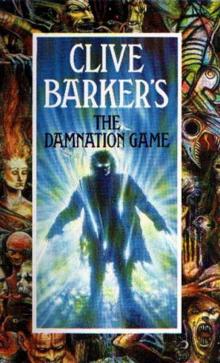 The Damnation Game
The Damnation Game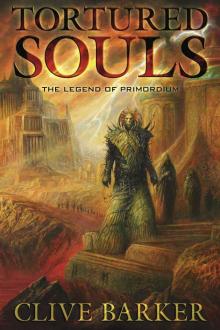 Tortured Souls: The Legend of Primordium
Tortured Souls: The Legend of Primordium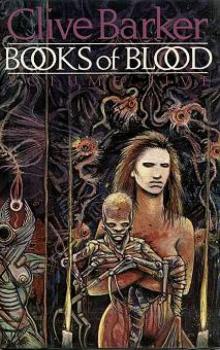 Books of Blood Vol 5
Books of Blood Vol 5 Imajica 02 - The Reconciliator
Imajica 02 - The Reconciliator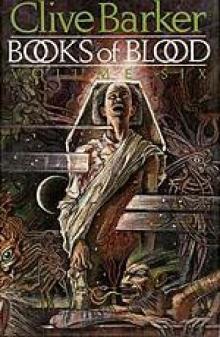 Books Of Blood Vol 6
Books Of Blood Vol 6 Imajica 01 - The Fifth Dominion
Imajica 01 - The Fifth Dominion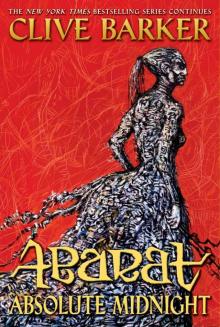 Abarat: Absolute Midnight
Abarat: Absolute Midnight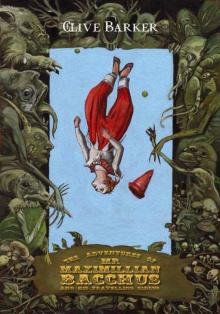 The Adventures of Mr. Maximillian Bacchus & His Traveling Circus
The Adventures of Mr. Maximillian Bacchus & His Traveling Circus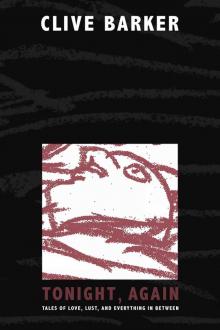 Tonight, Again
Tonight, Again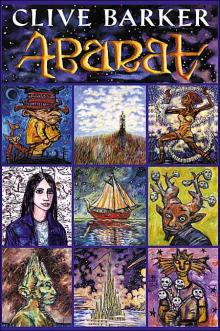 Abarat: The First Book of Hours a-1
Abarat: The First Book of Hours a-1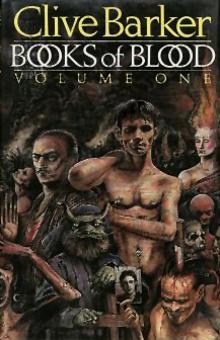 Books Of Blood Vol 1
Books Of Blood Vol 1 Age of Desire
Age of Desire Imajica: Annotated Edition
Imajica: Annotated Edition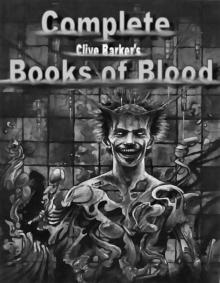 Complete Books of Blood
Complete Books of Blood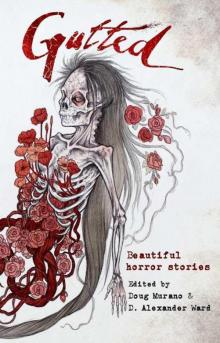 Gutted: Beautiful Horror Stories
Gutted: Beautiful Horror Stories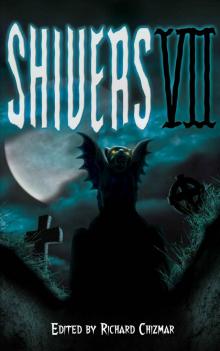 Shivers 7
Shivers 7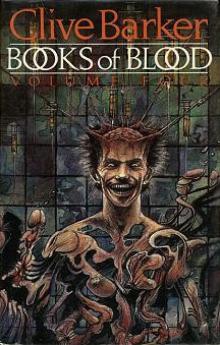 Books Of Blood Vol 4
Books Of Blood Vol 4